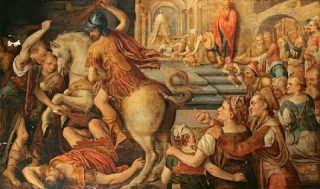“…it is not fitting for me, as a preacher, vested with the spiritual office, to wage war or to counsel war on incite it, but rather to dissuade from war and to direct to peace, as I have done until now with all diligence. All the world must bear witness to this.” [Martin Luther, A Warning to His Dear German People, LW 47:18]
Throughout the 1520s Dr. Luther had consistently argued against any active resistance to the unjust actions of the Imperial government. The political context played a central role in that change. On June 25, 1530, the Lutheran princes and political leaders presented their confession to Charles V at the Diet of Augsburg.

After the papal theologians presented their refutation of the Lutheran confession and further negotiations, Charles declared a recess and ordered the Lutheran princes to restore Catholic religious practices and Roman episcopal authority—or suffer the consequences in six months.
In late October 1530, Landgrave Philip of Hesse, asked Luther to write a treatise regarding the idea of resistance. Luther did publish a treatise, Warning to His Dear German People, in April 1531. Although he continued to have reservations toward the idea of active resistance to imperial authority in 1531, Luther set a defiant tone in the Warning.
This text began with an overview of the recent history. Luther argued that his side had sought peace and political compromise at Augsburg. However, the Roman clergy and princes responded with threats of violence and war. According to Luther, if war or rebellion emerged, the papal supporters would be the instigators, not the Lutherans. That is, the Romanists would become the real insurrectionists and disturbers of the peace. Luther was also willing to suffer persecution and accept his own death, but he stated God may “raise up a Judas Maccabeus” (a Jewish military leader from the Hanukkah stories) to defend the Lutheran cause and smash “Antiochus” (meaning the pope and his military supporters).
In the following section of the Warning, Luther argued that as a preacher he would not call for war, but rather he spoke against war and for peace. He knew the pro-papal German princes pretended to be putting down religious rebels. However, Luther wrote, “… if war breaks out—which God forbid—I will not reprove those who defend themselves against the murderous and bloodthirsty papists, nor let anyone else rebuke them for being seditious, but I will accept their action and let it pass as self-defense.” [LW 47:19]
He asserted that the papal supporters were the potential murderers and warmongers and, therefore, resisting them would be legitimate self-defense. In Luther’s position here, we have a classic statement supporting active resistance against aggressors: the Roman side acted maliciously during the Diet of Augsburg and did not really want peace.
Later in the Warning Luther explained in detail the rationale for supporting resistance. He set forth a more thorough statement when he wrote:
If the emperor should issue a call to arms against us on behalf of the pope or because of our teaching … no one should lend himself to it or obey the emperor in this event. All may rest assured that God has strictly forbidden compliance with such a command of the emperor. Whoever does obey him can be certain that he is disobedient to God and will lose both body and soul eternally in the war. For in this case the emperor would not only act in contravention of God and divine law but also in violation of his own imperial law, vow, duty, seal, and edicts. [LW 47:30]
In these sentences Luther set forth a powerful assertion of self-defense. Notice, Luther argued that, in this case, obedience to the temporal authority is disobedience to God. While he did seek to blame Pope Clement VII and the pro-papal princes for the strife, Luther affirmed self-defense based on positive law against an Imperial invasion. He even insisted that obedience to an unjust command brought death and damnation. As it turned out, the Imperial invasion did not take place in the early 1530s. Negotiations ended in the Nuremberg Standstill in 1532 that granted a truce and allowed princes to implement the Reformation in their own territories until the mid-1540s.
This is an abridged excerpt from an article that I wrote. If you want to read the entire article go here: Widerstand: Luther and the Freedom to Resist Unjust Authority